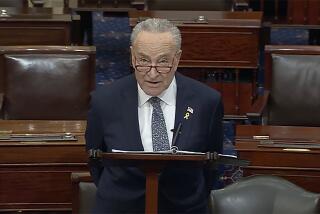Microsoft Loses an Ally in Congress
- Share via
WASHINGTON — In a sign that Microsoft Corp. may be losing friends in Congress, a New York senator who previously supported the software company flipped sides Tuesday and called on government antitrust regulators to go to court to block the scheduled release of the company’s Windows XP.
Sen. Charles E. Schumer, one of the few Democrats in Congress who opposed the breakup of Microsoft, said the company’s new operating system relied on anti-competitive technology that would reduce choice for consumers and hurt rivals.
Unless the company makes changes on its own or as part of a settlement, Schumer wants the Justice Department and 18 state attorneys general to seek a court injunction to prevent the release of Windows XP, which is expected to be shipped to computer manufacturers in August and be sold to the public Oct. 25.
“I have observed Microsoft engaging in what appear to be anti-competitive practices, and my views on the company are swiftly changing,” Schumer wrote in a letter to Microsoft Chief Executive Steve Ballmer. “It appears to me that Microsoft intends to maximize its monopolistic power, using XP as a platform to enter new lines of business while encumbering competitors.”
Schumer said he hoped to call Ballmer as a witness in September at a Senate Judiciary Committee hearing addressing Windows XP and other issues. It would be the first time since 1998 that Microsoft has been the subject of a congressional antitrust hearing.
Schumer’s turnaround and the Senate hearing are signs that the June 28 federal appeals court ruling is eroding Microsoft’s political support.
“Having the most conservative appeals court in the nation affirm the core part of the government’s case has had an effect on everyone, including Congress,” said Steve Salop, an antitrust professor at Georgetown University.
The appeals court, while throwing out a lower court’s breakup order for Microsoft, upheld the finding that the company violated federal antitrust laws by monopolizing the market for operating systems on personal computers.
Microsoft denied that Windows XP was anti-competitive and said Schumer was reacting to heavy lobbying by AOL Time Warner Inc. and Eastman Kodak Co., two New York-based companies that complained recently to Schumer that they would be hurt by Microsoft’s new product.
“Contrary to AOL’s self-interested lobbying, Windows XP is designed to enable user choice and partner opportunity,” Microsoft spokesman Vivek Varma said. “Windows XP is designed to bring more choice and options to consumers, not fewer, in stark contrast to AOL Time Warner’s closed, proprietary strategy.”
An AOL spokesman accused Microsoft of trying to divert attention from its antitrust problems by blaming rivals.
A Justice Department spokeswoman declined to comment on Schumer’s letter. A representative for New York Atty. Gen. Eliot Spitzer said the states had made no decision about whether they would seek to block Windows XP.
“Sen. Schumer’s letter highlights concerns that we believe should be addressed as part of the resolution of the case,” said Spitzer spokeswoman Juanita Scarlett.
The operating system will come bundled with several new features, including instant-messaging, a media player, Web browsers and digital-imaging software for photos. Microsoft says these new features will benefit consumers. Competitors fear that Windows XP will give preference to Microsoft products over those of other companies.
The Redmond, Wash.-based company also warned that any delays in releasing Windows XP would hurt the economy. “The timely launch of Windows XP is critical to reignite the PC industry in the United States,” Microsoft attorney Jack Krumholtz wrote Tuesday in a letter to Schumer.
Microsoft executives met Monday with government officials in Washington to discuss how they might resume settlement talks. Participants declined to discuss the details.
No subsequent meeting has been scheduled.






